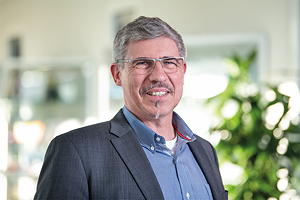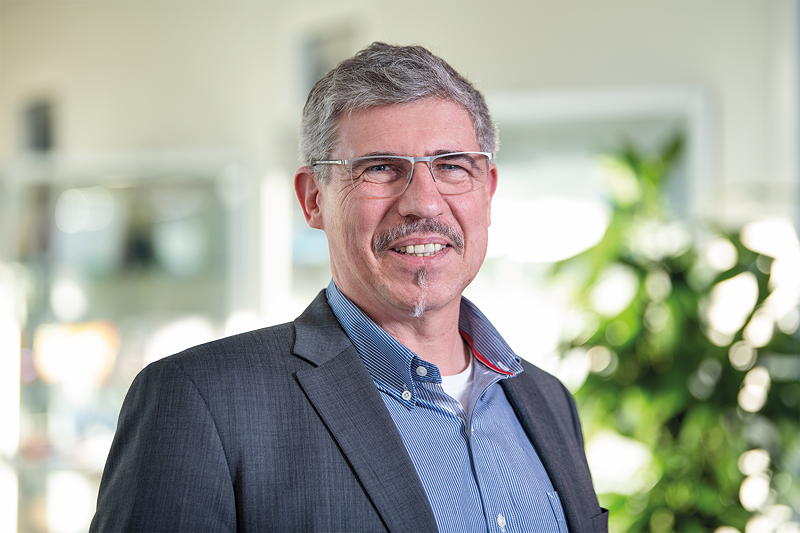An interview with Michael Graf, Director Consulting at Schubert-Consulting
Understanding the customers' customers

Michael Graf, Director Consulting of Schubert-Consulting
Quelle: Schubert-Consulting
Schubert-Consulting is a division of Schubert Packaging Systems which has its roots in Gerhard Schubert GmbH. Based on decades of expertise in the packaging sector, Michael Graf, Director Consulting, and his team advise customers on all processes relating to product packaging. The main focus of customer support is the comprehensive, fully manufacturer-independent analysis and optimisation of entire process chains – for greater efficiency, cost-effectiveness and sustainability. In this interview (provided by the company), Michael Graf reports on how Schubert-Consulting supports customers in meeting current and future market requirements – on the occasion of the division’s 10th anniversary in 2021.
What are you currently working on at Schubert-Consulting?
Michael Graf: What is keeping us very busy at the moment is something that is known as Connecting – in other words, bringing together the various participants involved in the entire packaging process. This begins with the different customer departments and extends to external partners. When a commissioned architect designs a modern factory hall on a greenfield site, they should know from the outset about the cubic metres of the machinery involved, the planned layout and the personnel requirements. Otherwise, the machines may have to be adapted to the hall and the production processes can no longer be implemented in an optimal manner. Our team at Schubert-Consulting helps bring the parties involved to the table at the beginning of a project and find a joint solution that makes the actual packaging process as efficient as possible.
The topic of packaging development is also definitely in line with current trends. Here especially, Connecting is absolutely necessary because packaging today has to meet numerous requirements that go far beyond product protection and transport. Just think of recyclability, enhanced marketing at the point of sale or market trends such as the individualisation of products and e-commerce. In collaboration with all partners, we can create economic added value through the development of new packaging, which is generated throughout the entire process chain, all the way to the consumer.
At what stage do customers turn to you and why?
Michael Graf: Most often, we provide support when manufacturers are planning a new packaging process and the implementation becomes difficult – when they are stuck in a project that is not progressing as it should. This often entails ideas and objectives that go beyond a single packaging machine as a solution, because the upstream and downstream processes strongly influence production. In cases such as this, it is important to take a close look at the entire supply and production chain in order to identify and eliminate any bottlenecks. This is why we specialise in the strategic planning of processes and corporate goals, especially for the fast-moving consumer goods and pharmaceutical industries. Our customers are very international: We offer our services in several regions of the globe ranging from German-speaking countries to Europe and North America.
You were on board from the very beginning. How did Schubert-Consulting originate back then?
Michael Graf: Before founding the company in 2011, I had gained experience as a senior project manager, in the pharmaceutical industry amongst others. One of my responsibilities was to prepare validations for the complex packaging processes used for pharmaceutical products. This gave me an opportunity to familiarise myself in depth with the topic of quality assurance. At the same time, a new business field emerged at Schubert Packaging Systems, at that time still under the name “Engineering Consulting”. Since then, Peter Gabriel and I have gradually built up the area. In 2016, the company was renamed Schubert-Consulting.
Our first projects arose from the customer’s wish for us to accompany the investment and realisation of a new packaging machine over the course of the project – also as a service provider. Customer support continues to be one of our central consulting pillars. From the very beginning, however, it was also my goal to transform the expertise acquired from other industries into the sectors that Schubert serves. I remember the early days at Schubert Consulting, where we were able to make very fast confectionery packaging machines even more efficient for our customers with the right quality management. Because reducing waste throughout the entire packaging process is and remains an important factor to this day. We are not only referring to the robots in the packaging machine, but also pre-processes such as baking ovens in which the product to be packaged is manufactured.
How has your portfolio evolved over the years?
Michael Graf: The next topic alongside quality assurance was logistics, including track and trace functions. This is more relevant today than ever before, when consumers would like to know which farm their milk on the breakfast table was sourced from. Schubert-Consulting’s range of services has therefore expanded from projects in existing factories and halls to simulations and new planning on greenfield sites. The most important working tool for us is a holistic view of the packaging processes as well as line integration, customising and customer advice on automation, digitalisation and sustainability. For each project we take on, we put together a new team that not only consists of one or more of our own employees, but also includes collaborations with universities, suppliers, associations such as the VDMA (Verband Deutscher Maschinen- und Anlagenbau e.V.) and other institutions, as required. Within the Schubert Group, we work together strategically across several business units.
Central to Schubert-Consulting, however, is our general independence from other Schubert companies. We attach great importance to manufacturer-independent consulting. This means that anyone who uses our services always has a choice of several different process solutions. The reason why we nevertheless carry the Schubert name in Schubert-Consulting with a certain pride is the packaging expertise we can demonstrate, resulting from decades of experience.
What has been your experience with consulting and what do your customers have to say?
Michael Graf: Many customers are under intense competitive and time pressures. Only very few have sufficiently comprehensive expertise in-house to establish new packaging processes or improve existing ones. The feedback we receive is consistently positive. We solve problems, we get production running and we make it more cost-effective as well. A key factor is also to find solutions that reach far into the future for the customer. This is why we always try to clarify how and where a customer wants to develop and grow. This sometimes results in scalable projects that are implemented gradually over several years.
All of this can only be achieved in a relationship based on confidence and collaboration. And this is why personal contact, in-depth preliminary discussions and the creation of a true partnership are the absolute prerequisites for a successful project. And for us, talking to our customers means, above all, understanding our customers. Listening, always asking different questions and thinking ahead, changing perspectives all the way to our customers’ customers. For example, if you have to unpack a medicine and struggle with the packaging, you are less likely to be compliant in taking it. With this in mind, our maxim has changed over time from “accompanying customers” to “understanding customers”.
How are you driving Schubert-Consulting into the future, especially in terms of the key issue of sustainability?
Michael Graf: We have been working on this for quite some time and have adopted the “Rethink” aspect of the 5Rs on sustainability as our guiding principle. Rethinking conventional approaches is exactly what is needed for the transformation to a more sustainable world, and it corresponds 100 per cent with the essence of Schubert-Consulting. We are broadening our view once again and looking at the process virtually from A to Z – from the raw product to the end consumer and, of course, recycling. This is based on the approach of keeping processes so stable that there are no rejects along the entire process chain. Because sustainability comes to a large extent from efficiency.
From this wider perspective, it follows that we also want to enter other niches, start-ups and sectors. We are committed to being trailblazers, to creating a think tank for the future, among other things with alliances and experts from a wide range of fields and institutions, such as the Fraunhofer Institute, research groups, manufacturers, etc. In doing so, we strive to lead our customers’ visions to sustainable success. I am delighted when our customers embark on their new projects with enthusiasm, because much more can be achieved than they initially thought possible. Premium added value, inspiration for further developments that we can give them and financial success for both sides – this is my goal and it’s ultimately what makes consulting fun.
(This interview was provided by a press release.)
Gerhard Schubert GmbH is a globally recognised market leader in top-loading packaging machines (TLM). For its digital, robot-based packaging machines, the family-owned company based in Crailsheim (Baden-Württemberg, Germany) builds on an interplay of simple mechanics, intelligent control technology and high modularity. Founded in 1966, the second generation of the company now employs 1,400 people.
(kb)















